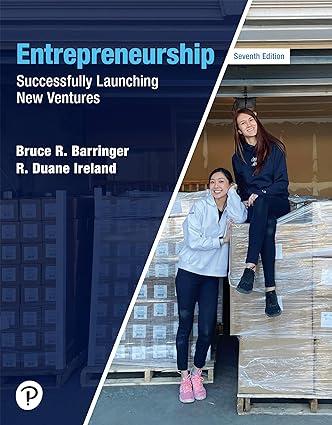Incubators are organizations that provide startups with shared operating space. They are sponsored by universities, city or
Question:
Incubators are organizations that provide startups with shared operating space. They are sponsored by universities, city or county governments, or nonprofit organizations.
Incubators also provide startup businesses access to networking opportunities, mentors, and shared equipment.
Incubators typically do not ask for equity from their participants and do not provide seed funding. Incubators were very popular in the 1980s and remain an important part of the entrepreneurial ecosystem in many areas.
Accelerators are a newer concept. They are mostly for-profit organizations that offer a small amount of seed funding in exchange for small equity positions in the companies participating in their programs. Most accelerator programs admit startups in cohorts and put the startups through a 10- to 15-week intensive program. The accelerator typically offers free office space, weekly meetings with mentors, and coaching on how to prepare an effective investor pitch. The programs normally cumulate with a “Demo Day,” which provides the participants an opportunity to pitch their business ideas to a group of investors, mentors, and reporters. The better programs will have 200+ investors present at their Demo Days. The greatest advantage of getting into either an incubator or accelerator program is the mentorship opportunities they provide.
They are also fertile places for entrepreneurs to meet potential cofounders, business partners, and investors.
The two most well-known accelerator programs are Y Combinator and TechStars. Y Combinator is in the Silicon Valley. Twice annually, it invests \($500,000\) per company in a group of startups. Y Combinator distributes the money in two rounds. It invests \($125,000\) initially for a 7 percent stake in the company, and an additional \($375,000\) for an equity stake to be determined later. Y Combinator’s motto is “Make Something People Want.” It does not offer office space. Instead, its program includes “office hours” where its startup founders meet individually and in groups with Y Combinator partners for advice. Founders also participate in weekly dinners where top-flight guests from the Silicon Valley ecosystem speak to the founders. People can apply to Y Combinator at www.ycombinator.com/apply.
TechStars is like Y Combinator in that it is a threemonth program. It provides \($20,000\) in initial funding in exchange for a 6 percent equity stake. Each company also receives an offer for an optional \($100,000\) convertible note. Started in Boulder, Colorado, TechStars now has 39 locations (in the United States and abroad) and has a hybrid and a virtual program. Many of the locations focus on a single industry. For example, the Tech-
Stars accelerator in Birmingham, Alabama, focuses on innovative electrical and utility solutions, while the location in Philadelphia focuses on media and entertainment startups. As with Y Combinator, TechStars surrounds its participants with mentors, corporate partners, and potential investors to help their startups succeed. You can initiate the application process at TechStars at www.techstars
.com/general-interest.
While admission to Y Combinator and TechStars is very competitive, there are a growing number of startup incubators and accelerators in many cities. Most are accessible to hard-working startup founders with promising business ideas. Many of these focus on a certain industry or sector, such as food, medical devices, software, mobile, or technology. To illustrate today’s prevalence of startup incubators and accelerators, the following is a list of them in three American cities. You can identify the startup incubators or accelerators in your area by speaking to local entrepreneurs or investors or by conducting a Google search.
Capital Innovators is a startup accelerator located in St. Louis. It provides tech startups seed funding, office space, and mentorship from C-suite executives, seasoned entrepreneurs, and technical experts. It also provides follow-up funding opportunities.
Innovation Works is a Pittsburgh-based business accelerator that provides funding, business skills, and resources to software, hardware, and life science startups throughout southwest Pennsylvania. The group’s mission is to make its region a center for innovative startups and investors from around the country.
Mass Challenge is a nonprofit startup accelerator headquartered in Boston. It has eight locations worldwide. It focuses on finance, financial services, social entrepreneurship, and social impact startups. Its unique equity-free model allows it to accelerate high-impact startups with bold, disruptive ideas from nontraditional backgrounds....
Discussion Questions:
1. If you were starting a new venture, do you think you would benefit from participating in a business incubator or accelerator program? If so, what do you anticipate would be the primary benefits?
2. Find an example of a startup incubator or accelerator program at the college or university you are attending, in the town in which you live, or in a city. Describe the program. Which one of the programs mentioned in this feature does it resemble the most?
3. If you have a promising business idea, what can you do while still in college to improve your chances of gaining admittance to a prestigious startup incubator or accelerator program when you graduate?
4. Make a list of the types of mentors that a participant in a startup incubator or accelerator program might encounter.
Step by Step Answer:

Entrepreneurship Successfully Launching New Ventures
ISBN: 9780138091828
7th Edition
Authors: Bruce R. Barringer, R Duane Ireland





